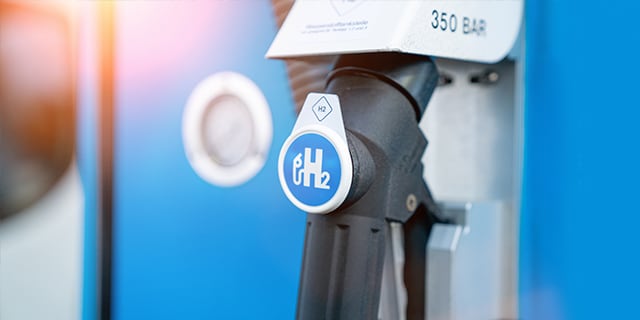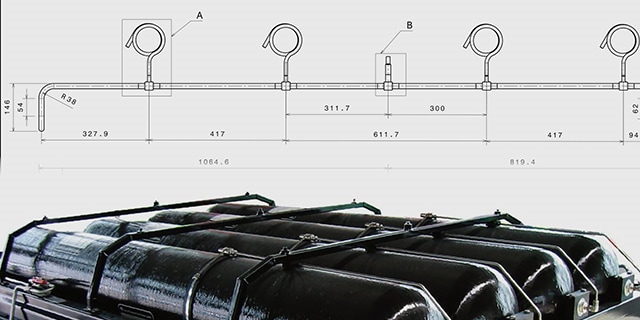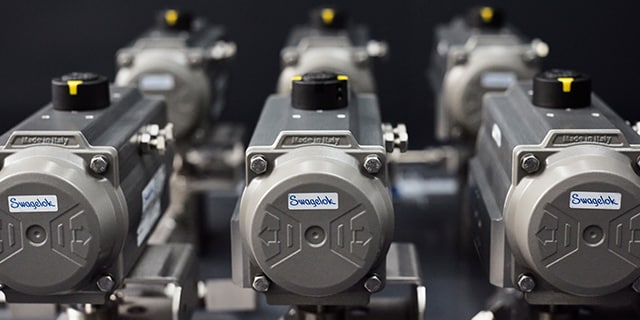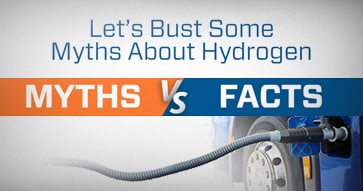Myth Busting: Learn the Facts About Hydrogen Fuel

Know Your Hydrogen Fuel Facts – Avoid Falling for Myths
Chuck Hayes, Principal Applications Engineer for Clean Energy, Swagelok
There is no doubt that the economy for hydrogen fuel cell vehicles and fueling is growing. But as the technology used to harness hydrogen gains more prominence, misinformation can become common. Misperceptions about hydrogen fuel typically revolve around its safety, viability as a mobility fuel, cost, and environmental impact.
Hydrogen has the potential to meet modern vehicle fueling needs, providing safety, reliability, cost-effectiveness, and environmental-friendliness. And, the advantages of hydrogen energy could very well make it the right, best path forward for the global economy as the world focuses on achieving a greener and more sustainable future.
Hydrogen Facts at-a-Glance
Check out an infographic version of this article for a downloadable visual that is easily shared to dispel hydrogen myths.
Here are four common myths about hydrogen worth reconsidering, as well as related facts about hydrogen fuel and its viability.
Jump to:
Is Hydrogen Gas Hazardous to Use or Store?
Hydrogen presents the same, if not fewer, hazards than other fuels due to its nontoxic and low-volatility characteristics. Additionally, numerous safety procedures and protocols are considered throughout each design stage of both hydrogen vehicles and hydrogen refueling infrastructure to enable safe and reliable performance. And when handled properly, hydrogen fueling technology provides an efficient and economical solution for modern mobility needs.
Hydrogen Fuel Fact: Hydrogen is 14 times lighter than air and 57 times lighter than gasoline vapor. It will typically rise and disperse rapidly when leaked, greatly reducing the risk of ignition at ground level.
Relative Vapor Density
Hydrogen Fuel Fact: Hydrogen is nontoxic, unlike conventional fuels. A hydrogen leak or spill will not contaminate the environment or threaten the health of humans or wildlife, as fossil fuels can.
Hydrogen Fuel Fact: The air around the flame of hydrogen is not as hot as around a gasoline flame. Therefore, the risk of a secondary fire is lower.
Hydrogen Fuel Fact: While hydrogen can be explosive with oxygen concentrations between 18% and 59%, gasoline can be explosive at oxygen concentrations between 1% and 3%. Meanwhile, gasoline has an autoignition temperature of 536°F (280°C), which is half that of H2 (995°F/535°C).
Autoignition Temperatures

Hydrogen Fuel Fact: Hydrogen fueling dispensers are designed to run multiple safety checks in both the dispensing equipment and the vehicle during the fueling process (start, midpoint, end).
Hydrogen Fuel Fact: There are multiple international certification programs that review hydrogen's safety as a mobility fuel. For example, Toyota has received approval from Japan’s Ministry of Economy, Trade, and Industry (METI) to self-inspect and manufacture hydrogen tanks for FCEVs.
Hydrogen Fuel Fact: Country-specific hydrogen fueling station codes have been developed in 22 countries and include CSA (Canadian Standards), ISO (International Organization for Standardization), and EN (European Standards).
Are Hydrogen Vehicles Impractical for Long-Range Use?
Range is a common concern for any budding transportation fueling technology—but it shouldn’t be for hydrogen. Because it maintains high energy density and it is particularly well-suited to heavy-duty vehicle applications, hydrogen's lighter weight can also help to maximize a heavy-duty truck’s payload volume, thereby increasing its range. Plus, high-speed refueling of hydrogen-powered vehicles is also possible, which helps to reduce the downtimes of vehicle fleets and equipment, fueling vehicles in minutes as opposed to hours for battery electric options. And while green hydrogen generation depends on wind, solar, and water—improved storage technologies can keep the clean energy flowing, regardless of the weather.

Hydrogen Fuel Cell Vehicle
Range: 200 to 250 Miles with 350 bar
400 to 500 Miles with 700 bar
Time to Refuel: 3 to 4 Minutes

Electric Vehicle
Range: 100 to 310 Miles

Gasoline Vehicle
Range: 300 to 400 Miles
Time to Refuel: 2 to 3 Minutes
Hydrogen Fuel Fact: Hydrogen has high energy density and therefore can deliver a comparable range to carbon-based fuels. Under pressure, it can also be stored and distributed as efficiently as these fuels.
Hydrogen Fuel Fact: While it is the most abundant element in the universe, hydrogen needs to be extracted from water or organic compounds. Diesel and gasoline also requires refining and cleaning of crude oil, however—and this process can also use hydrogen.
Hydrogen Fuel Fact: The major source of hydrogen today is extraction from natural gas (which is already a multibillion-dollar global industry).
Hydrogen Fuel Fact: Other hydrogen sources include renewables like solar, wind, or biogas. These energy sources power electrolysis, a process which uses electricity to separate water into useful hydrogen and oxygen.
Hydrogen Fuel Fact: Hydrogen refueling equipment can be added to existing fueling infrastructure and deliver comparable refueling times to gasoline and diesel.
Is Hydrogen Fuel Too Expensive to be Practical?
While conventional fuel remains cheaper today, the price of green hydrogen continues to fall. This price reduction is projected to accelerate over the next decade, making hydrogen truly comparable in price to other mobility fuel sources. Meanwhile, it is expected that government support will accelerate the growth of hydrogen at scale as CO2 emissions standards become stricter. Additionally, the cost and efficiency of renewable (solar, wind, water, etc.) energy resources continue to improve; it is anticipated this trend will extend to hydrogen fuel costs.
Total Cost of Ownership/USD per 100km

Hydrogen Fuel Fact: Major government initiatives, like the U.S. Department of Energy’s Earthshots program, are intended to spur development and bring down hydrogen costs.
Hydrogen Fuel Fact: High-quality fuel system components reduce the occurrence and cost of unexpected maintenance.
Is Hydrogen Fuel Environmentally Unfriendly or Unsustainable?
A common concern around hydrogen’s sustainability involves its production. But there are several ways to generate hydrogen, and most of them are more environmentally friendly than comparable fossil fuels. Plus, hydrogen use in a fuel cell creates no vehicle emissions except water—which will help to dramatically slash greenhouse gas generation globally.
Hydrogen Fuel Fact: Using hydrogen in a fuel cell creates no smoke or waste, and the only outputs are energy and pure water.
Hydrogen Fuel Fact: There are several processes by which hydrogen is produced, and most of these processes have reduced CO2 emissions.
Grey Hydrogen
Blue Hydrogen
Green Hydrogen
CO2 (ultimate goal)
Hydrogen Fuel Fact: Carbon capture technology offers a way to sequester carbon created by hydrogen production and permanently store it (or use it) for industrial purposes.
Hydrogen Fuel Fact: Government efforts are anticipated to support and promote long-term growth of the hydrogen fueling economy.
Know the Facts About Hydrogen Fuel
There are key advantages to hydrogen energy compared to other fuel sources, and hydrogen has the potential to reshape the transportation economy as we know it. As sustainability continues to grow as a global priority, hydrogen is the most viable, clean energy solution available for transportation use. The keys to its continued adoption are safe, reliable hydrogen vehicles and refueling systems that OEMs and other stakeholders can rely on now and depend on for years to come.

If you’re looking for components, services, and training for developing high-quality hydrogen systems, we can help. Swagelok has been providing solutions for the alternative fuel and transportation industry for many years, with products and assemblies designed specifically to help contain, store, and dispense hydrogen for mobility. Our specialists are ready to assist with your needs.
Related Hydrogen Fuel Articles

The Anatomy of a Hydrogen Fitting
Learn why fittings designed specifically for hydrogen applications can help fuel cell vehicle OEMs and infrastructure developers achieve safer and more reliable fuel systems.

Luxfer Hydrogen Fuel Cell Case Study
Swagelok’s spirit of collaboration and willingness to invest in an EC-79 certification enabled Luxfer to create fuel delivery systems to power 144 hydrogen fuel cell buses. Learn how Swagelok Manchester’s level of commitment drove innovation for Luxfer.

Building Mission-Critical Hydrogen Compressors
Learn why one pioneering hydrogen compressors manufacturer relies on Swagelok for high-quality fluid system solutions to propel the burgeoning hydrogen mobility marketplace.






